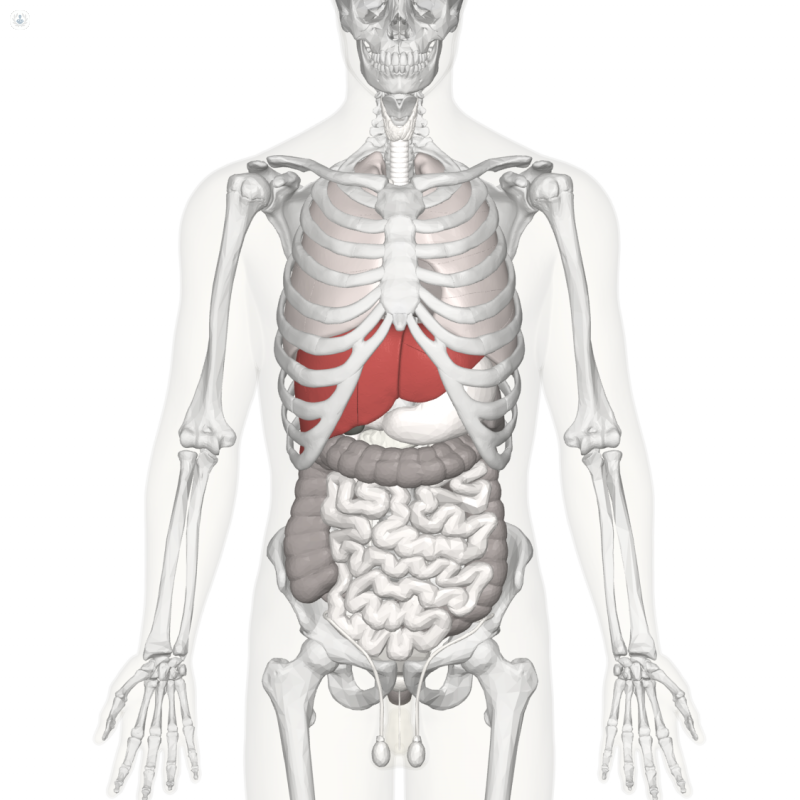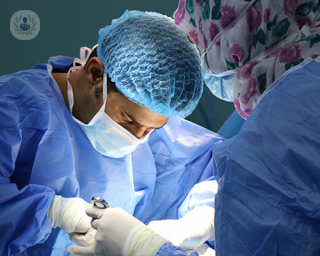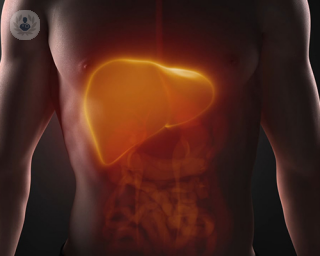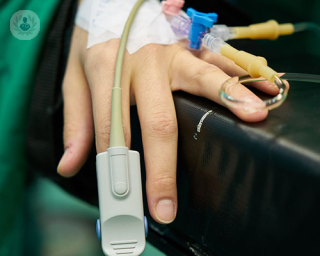What is liver surgery?
Liver surgery is the group of surgical procedures used to treat various liver problems, such as:
- Cirrhosis
- Liver cancer
- Hepatitis B and C
- Alcohol-related liver disease (ARLD)
The liver is the organ that is responsible for:
- Producing bile which helps the body to absorb fats and cholesterol.
- Removing toxins and bacteria from the blood.
- Processing hormones, nutrients and medication.
- Fighting infection
The main type of liver surgery is called a hepatectomy which involves the removal of part or all of the liver. This procedure is also known as a liver resection. If the whole liver is removed, then it is replaced with a healthy one – this is known as a liver transplant.

Why would you have liver surgery?
You would require a liver resection or transplant if your liver was partially damaged, or it can no longer perform its normal functions. Other treatment options would have been tried already, as surgery is needed when the underlying condition for liver problems can no longer be controlled non-surgically.
If just part of your liver is damaged, for example because of cancer, then just part of the liver can be removed surgically, leaving the healthy part of the liver intact.
If the patient suffers from liver failure, then a transplant is required, and without one long-term survival is not possible, as unlike other organs such as the kidneys, there is no machine or device (a dialysis machine) that can replicate the functions of what the liver does.
What does it involve?
A partial liver resection is performed under general anaesthetic and can take between two to five hours. This procedure is mostly carried out to treat either liver cancer or colorectal cancer. It is often performed alongside other treatments such as chemotherapy or radiation therapy. A resection can only be carried out if there are no major blood vessels compromised in the section that needs to be removed. Providing you do not suffer from other liver problems, such as cirrhosis, then the liver can recover and grow back.
A liver transplant involves the removal of the whole liver. The replacement liver must come from a donor that has a liver that is a close match to one’s own and come either from a deceased donor, or from a living donor (in which case the living donor has a section of their liver surgically removed and it is this section that is used to treat the transplant patient).
How to prepare for it
If you require a liver transplant, it involves being placed on a waiting list, as there are more in need of a liver transplant than there are livers available. The waiting list is ordered in terms of priority. Most people on the waiting list are able to stay at home until a viable liver becomes available.
When preparing for a liver transplant or resection it is important to be as healthy as possible, adopting a balanced diet, taking regular exercise and not drinking or smoking. It is important to be prepared at short notice for surgery.
Post-operative care
After a live transplant, there will be some time spent in an intensive care unit (ICU), where a ventilator machine will help you breathe. A stomach entering your nose and stomach will provide fluid and nutrients which are removed after a few days. Painkillers will also be administered. You can expect to leave the hospital after two weeks, after which you return home, but have regular check-ups to ensure the body is not rejecting the new liver.
After a liver resection, patients are generally well enough to leave the hospital within two weeks of the procedure, and recovery time depends on how much of your liver was removed, but does take a number of months.
11-13-2012 05-24-2023Liver surgery
Mr Satyajit Bhattacharya - Surgery
Created on: 11-13-2012
Updated on: 05-24-2023
Edited by: Conor Dunworth
What is liver surgery?
Liver surgery is the group of surgical procedures used to treat various liver problems, such as:
- Cirrhosis
- Liver cancer
- Hepatitis B and C
- Alcohol-related liver disease (ARLD)
The liver is the organ that is responsible for:
- Producing bile which helps the body to absorb fats and cholesterol.
- Removing toxins and bacteria from the blood.
- Processing hormones, nutrients and medication.
- Fighting infection
The main type of liver surgery is called a hepatectomy which involves the removal of part or all of the liver. This procedure is also known as a liver resection. If the whole liver is removed, then it is replaced with a healthy one – this is known as a liver transplant.

Why would you have liver surgery?
You would require a liver resection or transplant if your liver was partially damaged, or it can no longer perform its normal functions. Other treatment options would have been tried already, as surgery is needed when the underlying condition for liver problems can no longer be controlled non-surgically.
If just part of your liver is damaged, for example because of cancer, then just part of the liver can be removed surgically, leaving the healthy part of the liver intact.
If the patient suffers from liver failure, then a transplant is required, and without one long-term survival is not possible, as unlike other organs such as the kidneys, there is no machine or device (a dialysis machine) that can replicate the functions of what the liver does.
What does it involve?
A partial liver resection is performed under general anaesthetic and can take between two to five hours. This procedure is mostly carried out to treat either liver cancer or colorectal cancer. It is often performed alongside other treatments such as chemotherapy or radiation therapy. A resection can only be carried out if there are no major blood vessels compromised in the section that needs to be removed. Providing you do not suffer from other liver problems, such as cirrhosis, then the liver can recover and grow back.
A liver transplant involves the removal of the whole liver. The replacement liver must come from a donor that has a liver that is a close match to one’s own and come either from a deceased donor, or from a living donor (in which case the living donor has a section of their liver surgically removed and it is this section that is used to treat the transplant patient).
How to prepare for it
If you require a liver transplant, it involves being placed on a waiting list, as there are more in need of a liver transplant than there are livers available. The waiting list is ordered in terms of priority. Most people on the waiting list are able to stay at home until a viable liver becomes available.
When preparing for a liver transplant or resection it is important to be as healthy as possible, adopting a balanced diet, taking regular exercise and not drinking or smoking. It is important to be prepared at short notice for surgery.
Post-operative care
After a live transplant, there will be some time spent in an intensive care unit (ICU), where a ventilator machine will help you breathe. A stomach entering your nose and stomach will provide fluid and nutrients which are removed after a few days. Painkillers will also be administered. You can expect to leave the hospital after two weeks, after which you return home, but have regular check-ups to ensure the body is not rejecting the new liver.
After a liver resection, patients are generally well enough to leave the hospital within two weeks of the procedure, and recovery time depends on how much of your liver was removed, but does take a number of months.


An introduction to chronic liver disease and liver transplantation
By Mr Andreas Prachalias
2024-11-20
Mr Andreas Prachalias, a leading surgeon, explains the symptoms of chronic liver disease, how it is diagnosed and the complexities of liver transplant surgery. See more


What are benign liver tumours and are they dangerous?
By Mr Charles Imber
2024-11-20
Mr Charles Imber, a top surgeon and liver surgery expert, explains what benign liver tumours are and when they might require treatment. See more


When is liver surgery a must?
By Mr Charles Imber
2024-11-17
Liver surgery can be highly effective when it comes to removing cancerous tumours that are detected in one's liver. In this article, highly esteemed consultant general surgeon, Mr Charles Imber, reveals when liver surgery is required, explains how effective it can be, and outlines the recovery time and associated risks. See more


An expert's insight to liver surgery
By Mr Deepak Hariharan
2024-11-12
Renowned consultant general and hepato-pancreato-biliary surgeon Mr Deepak Hariharan provides us with an expert insight into liver surgery, including reasons for the procedure, what's involved and recovery. See more
Experts in Liver surgery
-
Mr Satyajit Bhattacharya
SurgeryExpert in:
- Gallbladder surgery
- Pancreas surgery
- Pancreatitis
- Liver surgery
- Liver cancer
- Pancreatic cancer
-
Mr Charles Imber
SurgeryExpert in:
- Gallbladder surgery
- Liver cancer
- Liver surgery
- Pancreas surgery
- Pancreatic cancer
- Hernia
-
Mr Andreas Prachalias
SurgeryExpert in:
- Liver transplant
- Liver surgery
- Pancreas surgery
- Gallbladder surgery
- Inguinal hernia
- Laparoscopy
-
Professor Hemant Kocher
SurgeryExpert in:
- Gallstones
- Liver cancer
- Liver surgery
- Pancreatic cancer
- Pancreatitis
- Pancreatic cyst
-
Mr Timothy Rees Worthington
SurgeryExpert in:
- Gallstones
- Hernia
- Pancreatitis
- Liver surgery
- Endoscopy
- Acid reflux
- See all

Cleveland Clinic London Rapid Access Gallbladder Unit
Cleveland Clinic London Rapid Access Gallbladder Unit
33 Grosvenor Place
No existe teléfono en el centro.
By using the telephone number provided by TOP DOCTORS, you automatically agree to let us use your phone number for statistical and commercial purposes. For further information, read our Privacy Policy
Top Doctors

London Bridge Hospital - part of HCA Healthcare
London Bridge Hospital - part of HCA Healthcare
27 Tooley St
No existe teléfono en el centro.
By using the telephone number provided by TOP DOCTORS, you automatically agree to let us use your phone number for statistical and commercial purposes. For further information, read our Privacy Policy
Top Doctors

The Princess Grace Hospital - part of HCA Healthcare
The Princess Grace Hospital - part of HCA Healthcare
The Princess Grace Hospital, 42-52 Nottingham Pl, W1U 5NY
No existe teléfono en el centro.
By using the telephone number provided by TOP DOCTORS, you automatically agree to let us use your phone number for statistical and commercial purposes. For further information, read our Privacy Policy
Top Doctors
-
Cleveland Clinic London Rapid Access Gallbladder Unit
33 Grosvenor Place, Central LondonExpert in:
- Blood test
- Minimal access surgery (keyhole surgery)
- Gallbladder surgery
- Robotic gallbladder surgery
- Diagnostic Imaging
- Ultrasound
-
London Bridge Hospital - part of HCA Healthcare
27 Tooley St, Central LondonExpert in:
- 24-hour service
- Cardiology
- Minimal access surgery (keyhole surgery)
- Orthopaedic surgery
- Cardiovascular disease
- Gastroenterology
-
The Princess Grace Hospital - part of HCA Healthcare
The Princess Grace Hospital, 42-52 Nottingham Pl, W1U 5NY, Central LondonExpert in:
- Cancer
- General Surgery
- Orthopaedic surgery
- Robotic Surgery
- Intensive care
- Sports Medicine
- See all
- Most viewed diseases, medical tests, and treatments
- Nutrition
- Weight loss injections
- Nipple discharge
- Abdominal pain
- Endovenous laser treatment (EVLA)
- Minimal access surgery (keyhole surgery)
- Head and neck cancer
- Neck lump
- Bariatric surgery
- Acellular dermal matrix (ADM)







